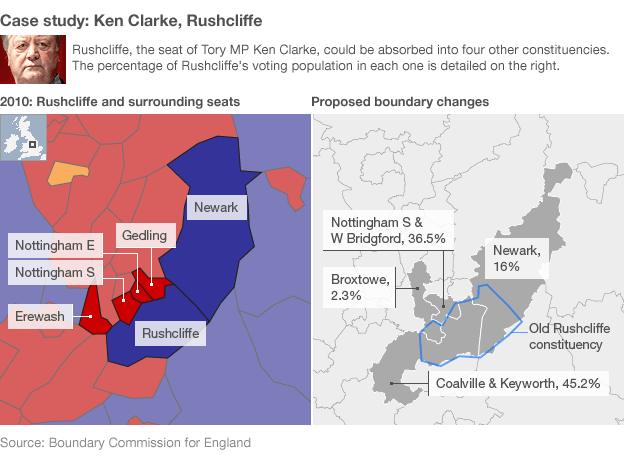Top MPs at risk in shake-up of English constituencies
- Published
- comments
Andrew Percy MP: "I'll be looking for a job"
Some of the most high-profile MPs in Parliament face seeing their seats disappear as part of a far-reaching shake-up of the Commons map in 2015.
Ken Clarke, Chris Huhne and Tessa Jowell are among those affected by Boundary Commission plans for England, external and Northern Ireland., external
The proposals are part of a move to cut the number of MPs by 50 to 600 by the next general election.
Details for Wales and Scotland will be published at a later date.
The government believes a smaller Commons will lower the cost of politics, saving £12m a year, while the system will be fairer as the electorate in each constituency will be more uniform.
Independent recommendations
But some Labour MPs have accused the coalition of gerrymandering while some Lib Dems are reported to be unhappy about the prospect of losing seats in the shake-up - agreed as a package earlier this year in combination with May's referendum on the voting system.
MPs whose constituencies are set to be effectively abolished will have to find another seat to contest if they wish to remain in Parliament, leading to a fierce scramble in the run-up to the next election.
The Boundary Commission for England has given details of the 502 constituencies, down from 533 last year, in which elections are likely to be held in 2015.
The full details of allocated English seats, as against 2010, are:
South East England: 83 seats (-1)
North West England: 68 (-7)
London - 68 seats (-5)
Eastern England: 56 seats (-2)
Yorkshire and Humber: 50 seats (-4)
West Midlands: 54 seats (-5)
South West England: 53 seats (-2)
East Midlands: 44 seats (-2)
North East England: 26 seats (-3)
Senior figures from all parties are likely to be affected by the changes.
Threat to MPs
Shadow Cabinet members Ed Balls and Hilary Benn could face a fight for one seat if their nearby constituencies in West Yorkshire are partly amalgamated.
In London, the Dulwich and West Norwood seat of former minister Tessa Jowell would be split into three while Labour frontbencher Chuka Umunna would see his Streatham seat divided up four ways.
Lib Dem MPs who could be under pressure include Chris Huhne, Vince Cable and Tim Farron.
Energy Secretary Mr Huhne's Eastleigh constituency would be split in two under the plans while Business Secretary Vince Cable, MP for Twickenham, could potentially find himself up against Conservative Zac Goldsmith, MP for Richmond Park, in a future contest.
'Tea room fuss'
Justice Secretary Ken Clarke's Rushcliffe constituency in Nottinghamshire would cease to exist in its current form.
He told the BBC he "regretted" its likely demise but would not rush into any decisions about his own future - preferring to wait until the outcome of the consultation.
"It all has to be handled carefully. But I am one of those who has been through boundary changes before and it usually works alright for those who go about it sensibly.
"The fuss in the (Commons) tea room will soon die down, I trust."
Conservative leader David Cameron, MP for Witney, and Labour leader Ed Miliband, MP for Doncaster North, are among 77 people whose constituencies would be unaffected by the changes.
MPs will be able to "appeal" against the provisional changes during a 12-week consultation taking place between now and December, external.
The Boundary Commission will publish revised proposals next year which will also be subject to exhaustive consultation before finally being submitted to Parliament for approval by October 2013.
It is encouraging the public to give their feedback on its proposals - including the names of constituencies - during a series of open hearings in October and November.
"The Commission was given clear principles and from that starting point we have found a solution that we think best meets Parliament's rules," said the Commission's secretary Simon James.
'More equal'
The government said the plan to shrink the Commons was "right" and had been spelled out in the coalition agreement between the Conservatives and Lib Dems.
"The constituencies used in the 2010 general election vary widely in size and this process will make them more equal and ensure everyone's vote has a more equal weight," a No 10 spokesman said.
Options open to MPs without seats include applying for selection in a new seat whose boundaries resemble their old one or going up against another MP for the right to represent a different seat.
Another option is to succeed any MP who chooses to retire and not stand again in 2015.
Details of proposed changes to Scottish constituencies will be published next month while the likely make-up of seats in Wales will become clear in January.
Professor John Curtice, an elections expert from the University of Strathclyde, said the existing electoral map discriminated against the Conservatives, due to population shifts over time and the comparative number of seats in England, Scotland and Wales.
The changes would reduce but not eliminate this "bias", he added.

- Published13 September 2011
- Published13 September 2011
- Published12 September 2011
- Published4 March 2011